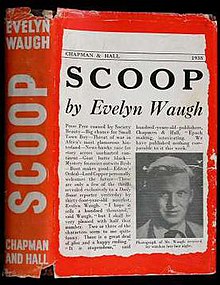Scoop (novel)

Jacket of the first UK edition
|
|
| Author | Evelyn Waugh |
|---|---|
| Country | United Kingdom |
| Language | English |
| Genre | Novel |
| Publisher | Chapman & Hall |
|
Publication date
|
1938 |
| Media type | Print (hardback & paperback) |
| Preceded by | A Handful of Dust |
| Followed by | Put Out More Flags |
Scoop is a 1938 novel by the English writer Evelyn Waugh. It is a satire of sensationalist journalism and foreign correspondents.
William Boot, a young man who lives in genteel poverty, far from the iniquities of London, contributes nature notes to Lord Copper's Daily Beast, a national daily newspaper. He is dragooned into becoming a foreign correspondent, when the editors mistake him for a fashionable novelist, a remote cousin; John Courtney Boot. He is sent to the fictional East African state of Ishmaelia to report on the crisis there. Lord Copper believes it "a very promising little war" and proposes "to give it fullest publicity". Despite his total ineptitude, Boot accidentally gets the "scoop" of the title. When he returns, the credit goes to the other Boot and he is left to return to his bucolic pursuits, much to his relief.
The novel is partly based on Waugh's experience of working for the Daily Mail, when he was sent to cover Benito Mussolini's expected invasion of Abyssinia, later known as the Second Italo-Abyssinian War (October 1935 to May 1936). When he got a scoop on the invasion, he telegraphed the story back in Latin for secrecy but they discarded it. Waugh wrote up his travels more factually in Waugh in Abyssinia (1936), which complements Scoop.
Lord Copper, the newspaper magnate, has been said to be an amalgam of Lord Northcliffe and Lord Beaverbrook: a character so fearsome that his obsequious foreign editor, Mr Salter, can never openly disagree with him, answering "Definitely, Lord Copper" and 'Up to a point, Lord Copper" in place of "yes" or "no". Lord Copper's idea of the lowliest of his employees is a book reviewer. The historian A. J. P. Taylor wrote, "I have Evelyn Waugh's authority for stating that Lord Beaverbrook was not the original of Lord Copper." Bill Deedes thought that the portrait of Copper exhibited the folie de grandeur of Rothermere and Beaverbrook and included "the ghost of Rothermere's elder brother, Lord Northcliffe. Before he died tragically, mentally deranged and attended by nurses, Northcliffe was already exhibiting some of Copper's eccentricities—his megalomania, his habit of giving ridiculous orders to underlings".
...
Wikipedia
